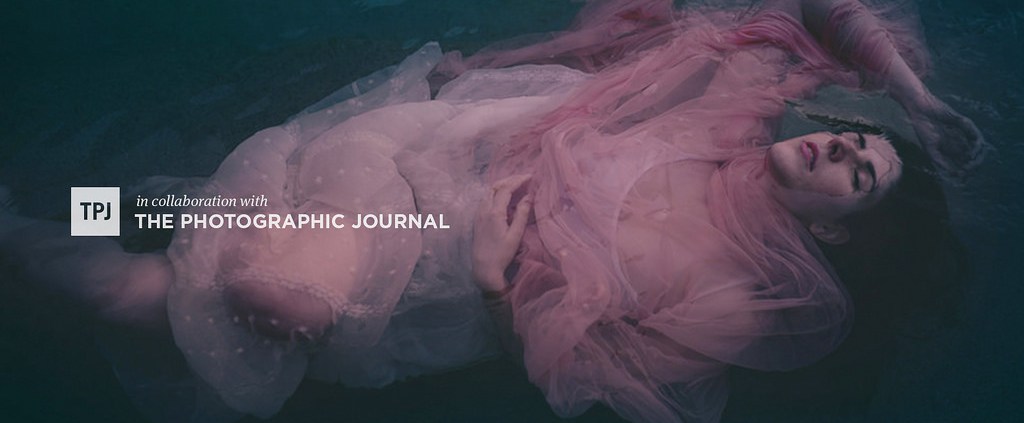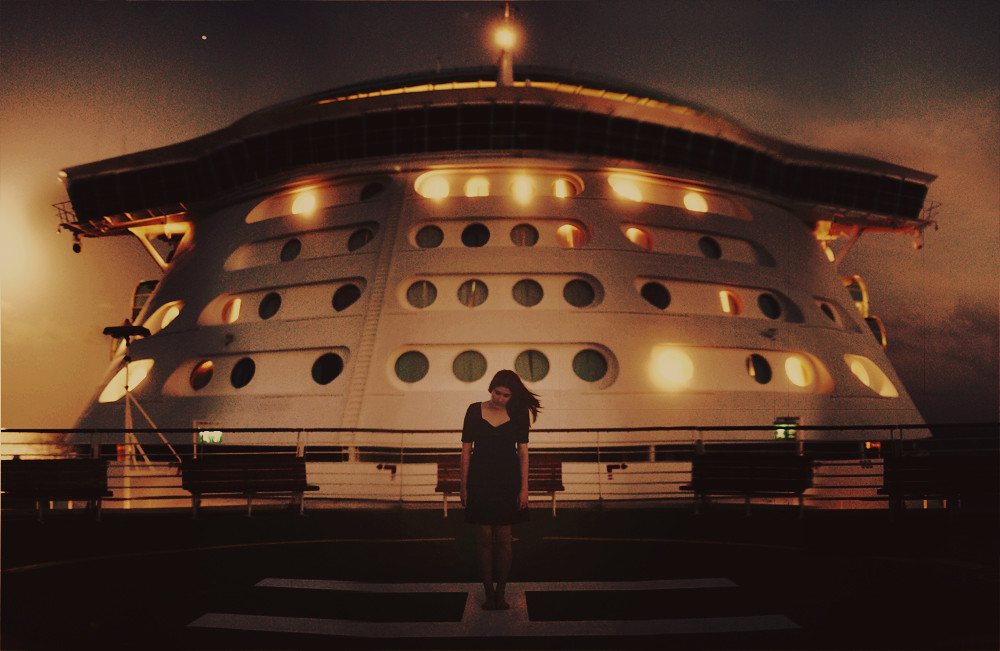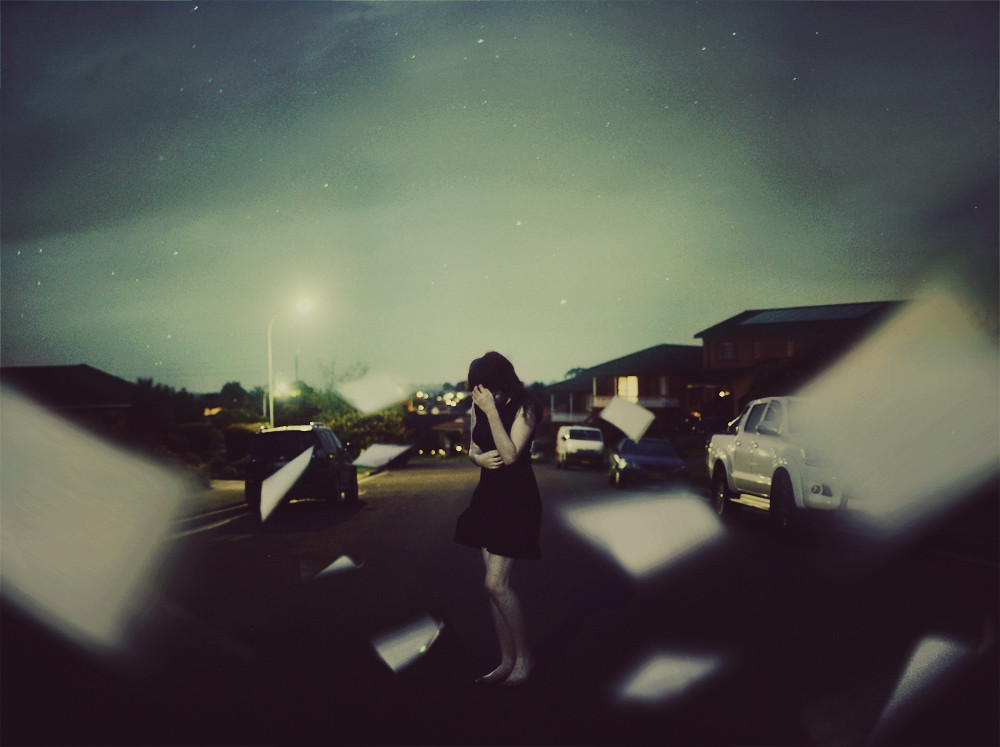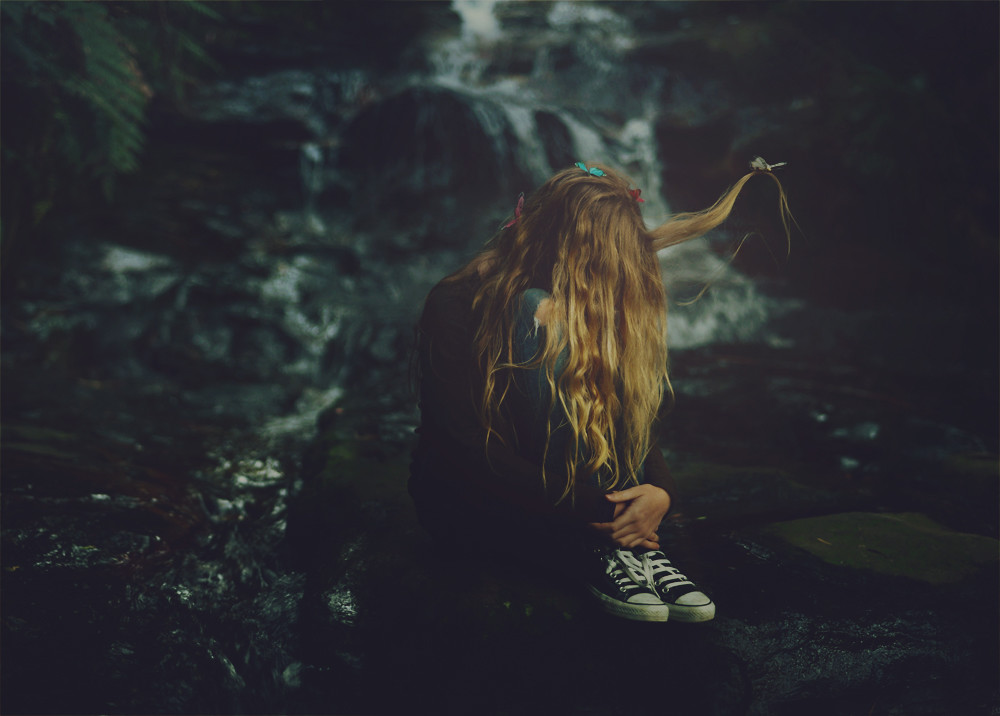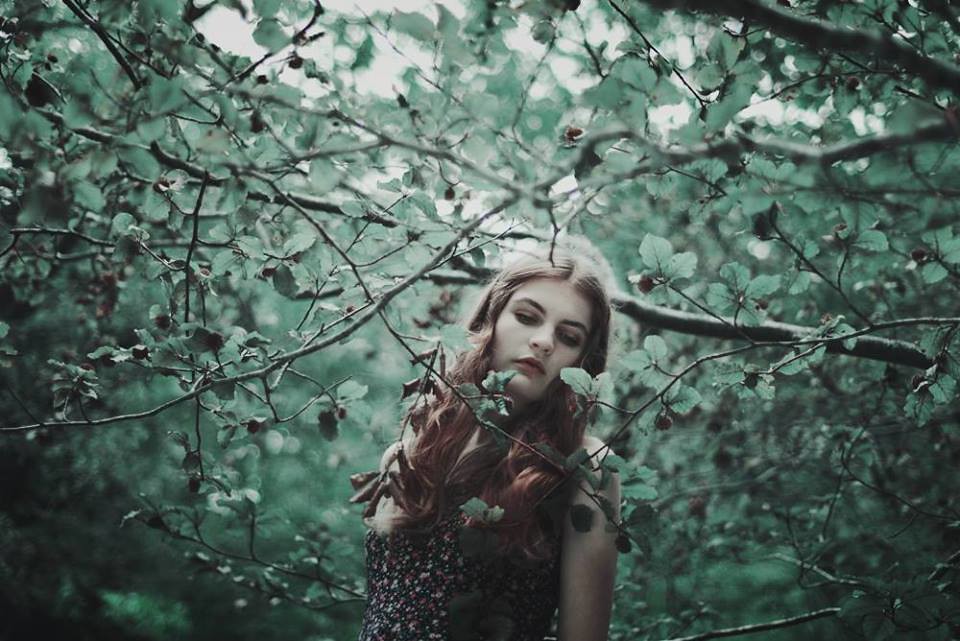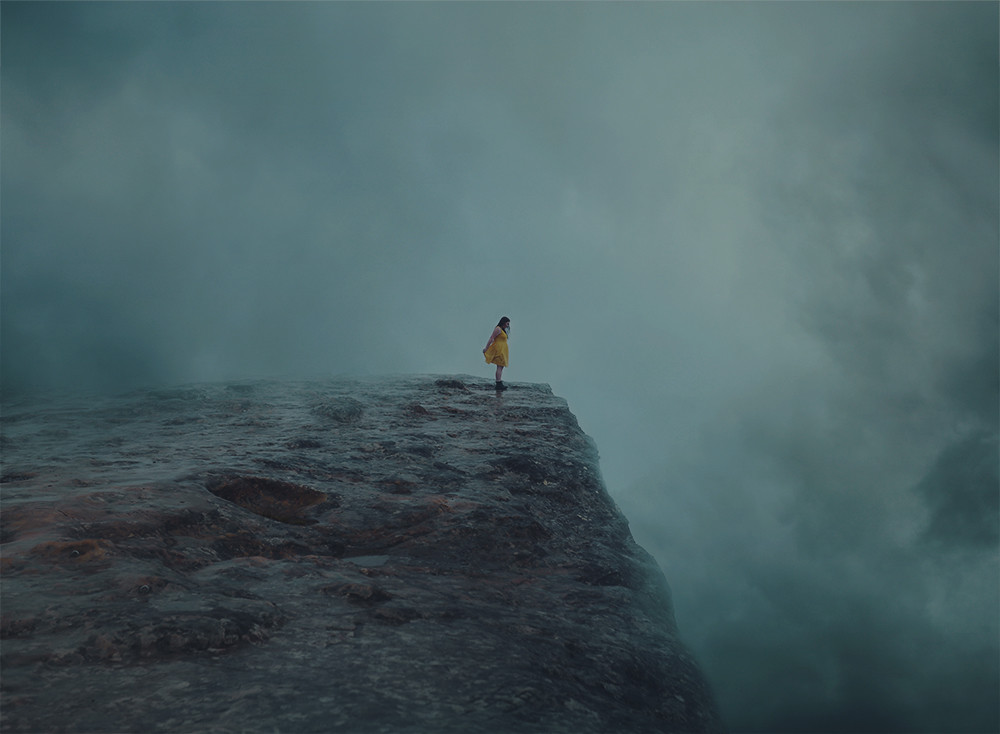This week we're proud to feature an all-new interview with Alexandra Benetel, from the folks at The Photographic Journal. Alexandra (one of the winners of the inaugural Flickr 20under20) creates photographs of mysterious and dream-like worlds, which are filled with oddities that enhance and distort reality, to wondrous effect.
How’d you get started in photography?
So it all began back in high school, when I took a Visual Design Course. I remember reading about the course itself and being very interested in what it entailed. I also remember noticing that it took me out of my comfort zone, which was partly why I ended up choosing it.
One of the subjects within the course that I ended up taking a particular liking to was Pinhole Photography. We were learning how to construct our own pinhole cameras, how to use them and finally develop the photos we took with them in the darkroom. I was completely fascinated by the entire process and ended up spending my lunchtimes in the darkroom developing my photos, just because I loved it so much. My teacher eventually made the entire class sign up for a Flickr account, to seek out the advice of other pinhole photographers. He also encouraged us to scan and upload our photographs, which I did and have continued to do ever since. Seeing the works of artists on Flickr was the final push I needed to really pursue this new interest.
In saying all this, I like to think that photography has always been in my life. My family and I have travelled a lot and I’ve always enjoyed taking photographs. One of the first memories I have of me actually taking a photo was back when I was eleven, in London, using a disposable camera. I was thinking about how to compose my next photograph, seeing as though I only had a limit of about thirty.
What was it that fascinated you about the darkroom process? Right now you work mainly with digital, yeah?
It was just something I’d never done before – a whole new world. I loved having complete control over my photograph. I was there every step of the way and the end product was well and truly my creation.
Yes – I work with digital now.
What brought about that transition? Do you miss the darkroom at all?
Well, the course lasted for two years and Pinhole Photography was only a small unit that ran within the first year. This meant that I eventually lost access to the darkroom. But, my interest in photography didn’t fade, so I continued to use my Flickr account. I communicated with other artists and eventually stumbled upon a community of individuals my age taking some really amazing digital self portraits. I wanted to try it myself, so I began experimenting with self portraiture in my backyard, using my point and shoot camera.
I miss the darkroom a lot. A few years later when I was a senior in high school, I took Photography as an elective. This time we learned about developing black and white film in the darkroom. Once again, I was hooked and spent my lunchtimes developing the film photographs I had taken of the city architecture. I’ve kept them all in a physical portfolio.
What was it about self-portraiture that drew you in? I see that’s definitely the trend with younger photographers starting out, what’s the appeal?
I just happened to stumble upon a group of teenagers on Flickr taking some of the most beautiful photographs I had ever seen. They were also using themselves as their subjects, so I decided to do the same. As this was a whole new thing for me, I wasn’t really at the point where I was comfortable enough to take another person’s portrait. I wanted to try it out first. When no one was home, I’d go into the backyard or roam around my house and experiment with different compositions, poses etc. I found it quite embarrassing at the start (taking pictures of myself) which was why I wasn’t sharing anything with anybody. I’d post my photos online, tell no one about it and began to receive some really nice comments, even some from the initial artists that inspired me to take self portraits. I then began sharing some of these photographs with my family and friends. Some found it weird and others found it really cool!
I agree that most young photographers experiment with self portraiture when they’re first starting out. I also have noticed that a lot of people perceive it as being extremely narcissistic. It really isn’t. Yeah, we all want to look good in a photo and I’m not going to lie and say I don’t think about that at some point whilst shooting a self portrait. But, it’s become more for me – a way of self expression and a way to tell a story. Some people do it through singing, writing, acting, dancing, I choose to do it through photography. I began with self portraiture because it was convenient. I was too shy to ask someone to pose for a photograph and I liked having control of the entire image (you’ve probably figured out I’m a little bit of a control freak). I believe trying to be the photographer, the model, the stylist etc. is a great way to fully understand the steps of achieving a good photograph.
My self portraits began as simple, pretty photographs, but my style has grown and developed into something with more depth. My main goal is to explore a solid concept, allowing the audience to relate to it in some way.
And now that you’ve branched out into shooting others, do you miss the “simple” days of shooting yourself? What is it you’re looking for, something you can’t get from yourself, or something you see in them?
I do, but I like to challenge myself. If I was still doing the same thing I was when I first started, then there’d be no growth. I still like taking simple portraits, but I’ve developed my style and I love my work to feel “other worldly” and have a clear concept. So, if I choose to share a simple portrait now, there has to be some sort of twist.
I love to create interesting characters in my work and I believe that every single person, whether they be a model or not, can bring something new to a photograph. Every face has a story, as they say. Some characters that I come up with don’t suit my look or the concept is too difficult to shoot as a self portrait.
I still mainly take self portraits. My collection of non self portraits feature photographers and friends I’ve met through Flickr, my friends I’ve grown up with, or the occasional model I’ve been in touch with.
When you talk about developing your style, are you in your day-to-day actively trying to carve out a style? Is it a conscious effort?
No, I believe I’ve already developed a style. Sometimes I won’t always stick to it, because I think it’s important to experiment. With experimentation comes growth and development and perhaps even a new style. I must mention that I have been there, ready to upload a photo, asking myself “Is this Flickr-worthy? Does it flow with my other photographs?” I’d like to think we’ve all been there at one point and that I’m not a crazy perfectionist.
The difficult part is creating works that interest and excite me. Often I’ll go out and shoot a concept I’ve thought up and it doesn’t work out. That’s incredibly frustrating because I want to create photographs that I’m proud of. Like I said, I’m a little bit of a perfectionist, so I have this mentality that my recent work has to top my previous work. I know that’s not the way I should think, because in reality, it’s not always going to be that way. I learned that through completing my 52 Weeks Project. Every photo that I take isn’t going to be amazing and I learned to deal with that. When it comes to something I love doing, which is taking photos, I care and I want my photos to be the best that they can be. With that comes stress and frustration. Every artist goes through that and ultimately, you just have to learn to accept it and move on. Just pick up your camera and try again.
Are there certain things you’re working towards with your current work? Particular challenges you’re tackling?
At the moment I’m just trying to shoot as much as possible. University takes up a lot of my time, but I try my best. I found that last year in particular, I wasn’t shooting as much as I would have liked to.
I’m hoping to work with others and collaborate with new people. I tend to just model for my concepts because it’s convenient and if I’m honest, due to the fact that I can find it a little daunting to work with others. Trying to explain a concept you see so clearly in your head to someone else is quite difficult.
Most of all, I feel like the next challenge to overcome is really putting myself out there. I don’t think I’ve taken the plunge yet. I want to take the opportunities that both excite and scare me.
And you’re studying photography at university?
I’m actually studying a Bachelor of Education (Primary).
I’m studying to become a Primary Teacher (Also referred to as an Elementary Teacher in other parts of the world).
So where does photography fit in? Hobby?
Yes, but this is my last year of uni and I’m hoping to take a break after I graduate.
The experience of Flickr 20under20 has inspired me to try out photography on a more full time basis, just to see where it takes me. I plan to travel in 2016, so who knows what opportunities may come up.
What was the 20under20 like, from your perspective? Us old folks just hung out and tried delicious pizzas, how’d you like it?
That sounds amazing though!
It was honestly the most random and incredible experience of my life. When Matthew first emailed me, I just couldn’t believe it. I did not expect it at all and then when I saw the list of other artists, I was even more blown away. Half of that list consisted of artists that inspired me when I first signed up for Flickr. They still inspire me every day and to think that I was actually going to meet them… In New York? Wow.
I was there for a week, but 20under20 went for about three days. Those three days and two nights can only be described as “surreal.”
I remember checking into the hotel where most of us were staying, bumping into almost everyone before the welcome dinner on that first night. I had so many moments where everything just froze in time. “Did I just meet [insert name here]?” was probably the most asked question in my head. Meeting people from the Internet is weird enough, but meeting people whose work you have literally followed since you were sixteen – wow. So cool.
I am so incredibly thankful for it and the entire thing feels like a dream. I wish we all got to chat more, but it all went so fast. I just want to go back and do it all again.
What was your biggest takeaway from that week?
I learned a lot that week, but I’ll mention two things. I’ve been using Flickr for a long time. There have been many times throughout those years where I thought it was impossible to reach a wider audience. I thought that there was no real point in continuing to share my work because was it actually doing me any good? The answer is yes.
I saw artists on Flickr who had only had an account for a year and were already receiving an abundance of comments and views. I’m going to be honest – it intimidated me. I was worried that my work just wasn’t good enough. But, I kept going, I tried new things, experimented, collaborated, reached out to artists on other platforms, made friends and travelled. I’m not saying you have to do all of these things, but you do need to love what you’re doing, be consistent and determined.
I never stopped posting and I’m so grateful that I didn’t because it ultimately contributed towards my growth into the artist I am today. You never know who is going to notice your work. I mean, the people behind Flickr noticed mine!! How crazy is that?!
The other thing I learned from Flickr 20under20 was that big opportunities like that don’t come everyday. You really have to seize the moment and use it. I was given some great advice from Rosie Hardy on the night of the exhibition. She was telling a group of us to not be afraid to put ourselves out there, to use this opportunity. Rosie has inspired me immensely since the beginning, so that advice is invaluable to me.
That brings up something I thought a lot about when I was looking through all your photostreams, back during the judging process. There’s a lot of attention by younger folks on Flickr on engaging with the audience. Print giveaways, getting Facebook fans, likes, etc. When you think of your photography journey, are the art and the business separate, or different aspects of the same thing? Are you working on improving at the same time you’re working on building an audience?
Everyone wants their work to be seen and to have that audience interaction. You can link to your social media pages, have as many print giveaways as you like, but if you’re not giving back to other artists, it’s not going to happen. I’m more referring to the early stages of your artistic career. It’s not like you’re going to wake up and have all of these “fans” or “followers.” You’ve got to work at it.
You need to be an active member on social media (if that’s where you’re sharing your work), by not only sharing your own work but leaving comments for others. When I received a nice, long and detailed comment on Flickr from another user, I would immediately check out their stream. You need to build a relationship with your audience. Treat others how you want to be treated.
I realise I have a good following here on Flickr now, but that didn’t happen overnight. I used to worry about that sort of stuff (not saying I still don’t – just a little less) but as the years went on, I was more concerned with my work. I wanted to produce unique photographs and have my own voice.
Yes, I’m still trying to get more people to see my work through the use of other social media sites. It just so happens that creating photographs that I am proud of and growing as an artist have become more important.
It’s a balancing act.
But, and I’m thinking here about when you were first starting on Flickr, were/are you thinking about it all as part of Photography? I know for many older photographers, the social aspect is often separate from photography, it’s purely promotion, or at the very least ancillary to photography, for them.
Oh! Right.
I think they interconnect. But, like I’ve said before it’s a hobby for me, not a business. I do it on the side because I’m a full time student studying something completely different.
There are some business aspects within photography that I’ve had to deal with along the way, which isn’t the best aspect of it, but was required. Those instances have only come up within the last year or so, so to answer the question of whether I thought business and photography were separate? Yeah, I thought they were at first. Now I realise maybe not so much.
But, I’m not even thinking of it as a business. I create photos in my spare time because I love it. It’s grown into a passion and therefore makes me happy. That’s all it is…for right now.
I hope that answers your question a little better? You can tell, I’m still learning about the relationship between business and photography, which is partly why I don’t consider myself as a professional photographer.
Answers it just fine!
For more in-depth interviews with fantastic photographers, check out The Photographic Journal.
